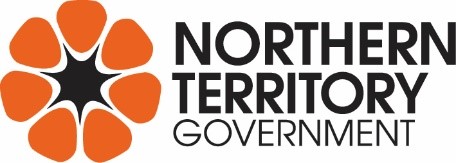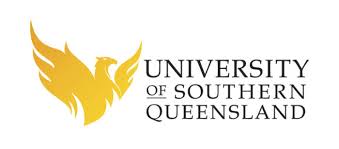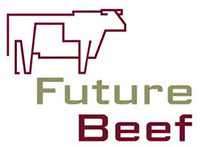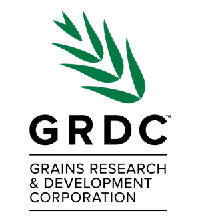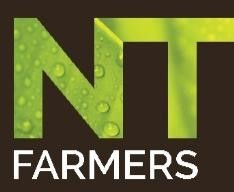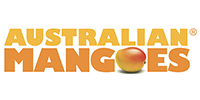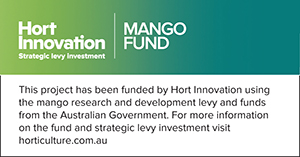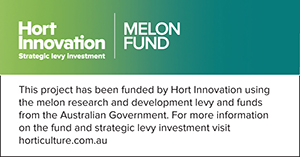Agriculture webinars
During the COVID-19 interstate travel restrictions, the Department of Agriculture and Fisheries (DAF) brought a series of nine weekly webinars to showcase national and local projects.
Cucumber green mottle mosaic virus bee research
Understanding and managing the role of honey bees in cucumber green mottle mosaic virus (CGMMV) epidemiology is an initiative of Hort Innovation. This research project is exploring whether honey bees are able to introduce CGMMV into melon crops from infested hives. The project will then develop management practices to combat this issue in the melon and apiary industries.
Exposure to CGMMV is a significant concern for melon growers and the bee industry, with the virus being highly destructive and contagious. It was first detected in Australia in the Northern Territory in 2014, and has now been detected in the majority of states and territories.
The project’s work, a strategic levy investment in the Hort Innovation Melon Fund, will build on earlier research in the Hort Innovation Vegetable Fund, and deliver updated fact sheets and management plans. The final report and management resources from the previous project are available online at the Australian Melons Association website or the Hort Innovation website.
Webinar details
Speaker: Dr Darsh Rathnayake is a research scientist with DAF, working on the Hort Innovation project.
Industrial hemp regulations
On 6 May 2020, the Northern Territory’s (NT) Hemp Industry Act 2019 and associated regulations commenced.
The new Act provides the authorising environment and framework to regulate production of low Tetrahydrocannabinol (THC) cannabis species known as industrial cannabis, for food, fibre and seed production. In the NT you need a licence to possess, cultivate, process or supply industrial hemp. This presentation will cover some of the basic requirements when applying for a licence.
For more information on industrial hemp regulations and conditions, go to the Northern Territory Government website.
Webinar details
Speaker: Warren Hunt, from DAF has 28 years of experience in rural industry capacity building, and has recently drafted the policy settings for allowing industrial hemp production in the Northern Territory.
Melon food safety
‘Safe Melons’ is an initiative of the New South Wales (NSW) Department of Primary Industries (DPI) supporting the Australian melon industry with scientific evidence-based best practice on food safety.
This collaborative initiative is supported nationally by Hort Innovation, the Australian Melon Association, state government agencies and growers’ organisations. As part of the initiative, the webinar will focus on critical food safety control measures in growing and packing all types of melons.
Prior to the webinar participants are encouraged to access the melon food safety resources available online at NSW DPI’s website.
Webinar details
Speaker: Dr SP Singh is a Horticultural Food Safety Scientist at the NSW DPI currently researching ways to mitigate food safety risks to horticultural industries and consumers. Dr Singh has worked with the Australian melon industry for over five years and brings a wealth of practical knowledge and experience in managing food safety risks in the industry.
Mango best practice
Designed to support the mango industry, this session presents an update on Hort Innovation’s latest capacity building project for the industry.
Beginning in mid-2018, the project ‘Building Best Management Practice Capacity for the Australian Mango Industry (MG17000)’ aims to improve the Australian mango industry’s profitability and sustainability. In particular, the department will lead the development of flowering, irrigation, forecasting and resin canal discolouration content.
Webinar details
Speaker: Matt Hall, is the Director of Plant Industries at DAF.
Livestock project
This session will provide an update on research and targeted livestock extension services including an overview of the Calf Watch project.
Webinar details
Speaker: Eleanor Fordyce, Beef Extension Officer, DAF.
Spicing up the north
Through the Cooperative Research Centre for Developing Northern Australia (CRCNA), CQ University researchers, our growers and partners are trialling the performance of five different spice crops – black sesame, cumin, caraway, kalonji, and fennel – at sites across Northern Australia.
Aimed at building supply chain links to establish a new spice industry for the North, this session will provide an overview of the five spices project as well as performance insights from the first harvest.
Find the project updates and market analysis for the five crops on the CRCNA website.
Webinar details
Speaker: A/P Surya Bhattarai and research fellow Dr Tieneke Trotter, from CQ University, are the chief investigator and project manager for the CRCNA project.
Broadacre cropping in the Territory
This webinar will present an update on the Cooperative Research Centre for Developing Northern Australia (CRCNA) cropping project. The project will collate historical broadacre cropping data, natural resource information and an understanding of market opportunities to support the development of viable broadacre cropping systems in the Northern Territory.
Each of the project participants brings unique expertise to develop crop management strategies that will help to de-risk broadacre agriculture in the Top End. This project will initially focus on rain-fed and irrigated systems growing cotton and peanut crop. Maize, sorghum, rice and pulse crops will also be investigated as possible 'break-crop' options for cotton and peanut producers. A mixture of on-field and simulation techniques will be used throughout this project.
For more information on the project, visit the CRCNA webpage.
Webinar details
Speaker: Ian Biggs is the Senior Research Agronomist with DAF.
NT water resource information
There is a wealth of online information around water in the Northern Territory (NT), spanning from bore permit applications, water extraction, licencing, data, groundwater watch and natural resource mapping. Join Tim Bond, from Department of Lands, Planning and Environment (DLPE), as he discusses the range of NT water resource information available for growers and the general public.
Download the list of links PDF (115.8 KB) to the resources covered in this talk.
Webinar details
Speaker: Tim Bond, Director Water Planning and Engagement at DLPE.
Give feedback about this page.
Share this page:
URL copied!
